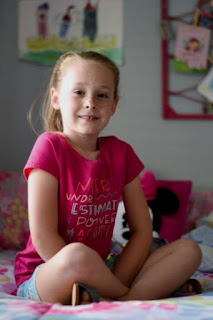For Children to Know They're a Different Gender?
 |
| Gracie, 7 she socially transitioned at the age of 4 |
By: Jon Brooks Aug 26, 2018
Gracie is the youngest transgender person I've ever met. She's so young, she still likes to tack on "and-a-half" when giving her age, which is six. One day last summer, bouncing all over the grounds at day camp, she looked as delighted as you'd expect any kid would on "Water Day.”
The Controversial Research on 'Desistance' in Transgender Youth
This is Rainbow Day Camp, in the East Bay town of El Cerrito. It was created specifically to be a safe place for transgender kids, and in fact, being transgender is so unremarkable here, when I asked Gracie what makes it “special," she shrugged and said:
“You get to do fun stuff.”
Her mother, Molly, tried to coax a reporter-friendly answer out of her.
“What is special about you, and the same as everybody else in the camp?” she prompted.
“I don’t know,” Gracie said.
“You’re transgender and there’s other kids that are transgender, too...”
“I’m transgender and there’s other kids that are transgender, too.”
Ah, kids. ... But when I asked Gracie how she used to feel, when other people thought she was a boy, she got straight to the point.
“It was not right to me, and I didn’t want people to say that, but they said it,” she said. “It hurted my feelings a lot."
Did it make her angry?
“No, it just made me sad.”
Email the reporter
How about now?
“It feels happy to me.”
And that, in a child’s nutshell, sums up one side of a contentious debate about the right age for transgender children to begin what gender clinicians call “social transitioning.”
 |
| Phoenix, a transgender girl Began wearing dresses to school at age 5 . |
“Why would we deny for the vast majority of kids something that is basically suicide prevention?”
As a parent, I wonder: If my daughter became incandescently happy when allowed to change her name and take on other aspects of being transgender — as happy as Molly describes Gracie becoming when recognized as a girl — what would I do? If some statistics indicated my child might one day switch back, but my deepest parental instincts told me to trust her joyfulness, could I ignore the latter?
At Rainbow Day Camp, I spoke to James, a 9-year-old transgender boy who’d transitioned during second grade. He told me matter-of-factly that he’d been bullied by older kids, who’d called him an “It.”
After he transitioned, his mother said, “There was just this comfort that came about him, and comfort's something that you can't really fake. He’s [just] a happier kid.”
Similarly, before Gracie’s transition, family life was “lackluster,” Molly recalled. The constant tension drained the joy out of childhood for everybody.
“You never got to see that sort of sparkle, or that sort of magic of, like, a Christmas morning, or a Halloween, or just regular day-to-day happiness,” Molly said.
“Now she gets to really live.”


Interesting my granddaughter came out to her parents and us when she was 7, she's nine now and living the life we all wish we could have when we first understood those inner feelings.
ReplyDeleteHappy New Year!!!!
transitioning is a big decision for doctors and parents and it seems some older kids are pushed in to it.but from what I have learned from my friends and my own experience
ReplyDeletethe confidence level re a transition should go way up for anyone who has the same experience as these kids i.e. they KNEW almost right out of the starting gate-emily